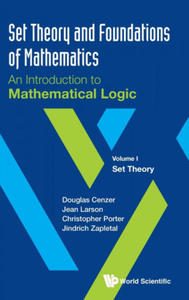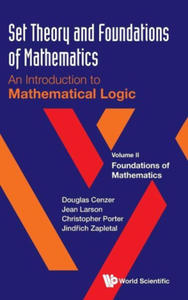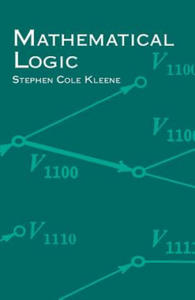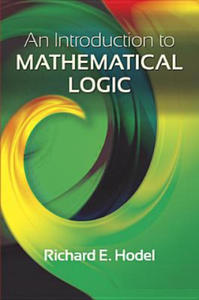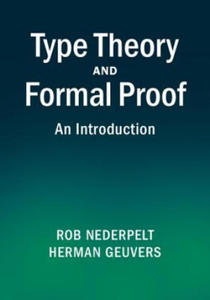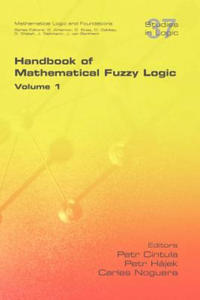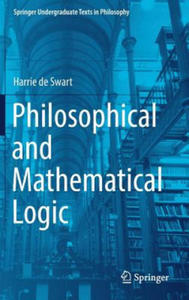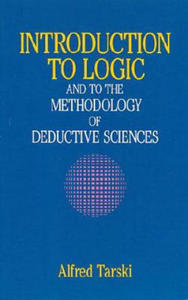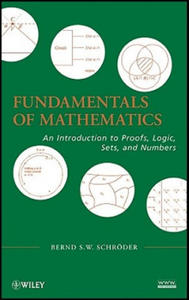libristo an introduction to mathematical logic and type theory 4194620
- znaleziono 50 produkty w 2 sklepach
Set Theory And Foundations Of Mathematics: An Introduction To Mathematical Logic - Volume I: Set Theory World Scientific Publishing Co Pte Ltd
Książki / Literatura obcojęzyczna
This book provides an introduction to axiomatic set theory and descriptive set theory. It is written for the upper level undergraduate or beginning graduate students to help them prepare for advanced study in set theory and mathematical logic as well as
Sklep: Libristo.pl
Set Theory And Foundations Of Mathematics: An Introduction To Mathematical Logic - Volume Ii: Foundations Of Mathematics World Scientific Publishing Co Pte Ltd
Książki / Literatura obcojęzyczna
Sklep: Libristo.pl
Mathematical Logic Dover Publications Inc.
Książki / Literatura obcojęzyczna
PART I. ELEMENTARY MATHEMATICAL LOGICCHAPTER I. THE PROPOSITIONAL CALCULUS 1. Linguistic considerations: formulas 2. "Model theory: truth tables,validity " 3. "Model theory: the substitution rule, a collection of valid formulas" 4. Model theory: implication and equivalence 5. Model theory: chains of equivalences 6. Model theory: duality 7. Model theory: valid consequence 8. Model theory: condensed truth tables 9. Proof theory: provability and deducibility 10. Proof theory: the deduction theorem 11. "Proof theory: consistency, introduction and elimination rules" 12. Proof theory: completeness 13. Proof theory: use of derived rules 14. Applications to ordinary language: analysis of arguments 15. Applications to ordinary language: incompletely stated arguments CHAPTER II. THE PREDICATE CALCULUS 16. "Linguistic considerations: formulas, free and bound occurrences of variables" 17. "Model theory: domains, validity" 18. Model theory: basic results on validity 19. Model theory: further results on validity 20. Model theory: valid consequence 21. Proof theory: provability and deducibility 22. Proof theory: the deduction theorem 23. "Proof theory: consistency, introduction and elimination rules" 24. "Proof theory: replacement, chains of equivalences" 25. "Proof theory: alterations of quantifiers, prenex form" 26. "Applications to ordinary language: sets, Aristotelian categorical forms" 27. Applications to ordinary language: more on translating words into symbolsCHAPTER III. THE PREDICATE CALCULUS WITH EQUALITY 28. "Functions, terms" 29. Equality 30. "Equality vs. equivalence, extensionality" 31. DescriptionsPART II. MATHEMATICAL LOGIC AND THE FOUNDATIONS OF MATHEMATICSCHAPTER IV. THE FOUNDATIONS OF MATHEMATICS 32. Countable sets 33. Cantor's diagonal method 34. Abstract sets 35. The paradoxes 36. Axiomatic thinking vs. intuitive thinking in mathematics 37. "Formal systems, metamathematics" 38. Formal number theory 39. Some other formal systemsCHAPTER V. COMPUTABILITY AND DECIDABILITY 40. Decision and computation procedures 41. "Turing machines, Church's thesis" 42. Church's theorem (via Turing machines) 43. Applications to formal number theory: undecidability (Church) and incompleteness (Gödel's theorem) 44. Applications to formal number theory: consistency proofs (Gödel's second theorem) 45. "Application to the predicate calculus (Church, Turing)" 46. "Degrees of unsolvability (Post), hierarchies (Kleene, Mostowski)." 47. Undecidability and incompleteness using only simple consistency (Rosser)CHAPTER VI. THE PREDICATE CALCULUS (ADDITIONAL TOPICS) 48. Gödel's completeness theorem: introduction 49. Gödel's completeness theorem: the basic discovery 50. "Gödel's completeness theorem with a Gentzen-type formal system, the Löwenheim-Skolem theorem" 51. Gödel's completeness theorem (with a Hilbert-type formal system) 52. "Gödel's completeness theorem, and the Löwenheim-Skolem theorem, in the predicate calculus with equality" 53. Skolen's paradox and nonstandard models of arithmetic 54. Gentzen's theorem 55. "Permutability, Herbrand's theorem" 56. Craig's interpolation theorem 57. "Beth's theorem on definability, Robinson's consistency theorem"BIBLIOGRAPHYTHEOREM AND LEMMA NUMBERS: PAGESLIST OF POSTULATESSYMBOLS AND NOTATIONSINDEX
Sklep: Libristo.pl
Introduction to Mathematical Logic Dover Publications Inc.
Książki / Literatura obcojęzyczna
Preface 1. Background 2. Language and Semantics of Propositional Logic 3. Propositional Logic 4. First-Order Languages 5. First-Order Logic 6. Mathematics and Logic 7. Incompleteness, Undecidability and Indefinability 8. Recursive Functions 9. Compatability Theory 10. Hilbert's Tenth Problem Appendix: Number Theory References and recommended readings Index
Sklep: Libristo.pl
Introduction to Mathematical Logic Apple Academic Press Inc.
Książki / Literatura obcojęzyczna
The new edition of this classic textbook, Introduction to Mathematical Logic, Sixth Edition explores the principal topics of mathematical logic. It covers propositional logic, first-order logic, first-order number theory, axiomatic set theory, an
Sklep: Libristo.pl
Introduction to Mathematical Logic World Scientific Publishing
Książki / Literatura obcojęzyczna
This is a systematic and well-paced introduction to mathematical logic. Excellent as a course text, the book does not presuppose any previous knowledge and can be used also for self-study by more ambitious students. Starting with the basics of set theory, induction and computability, it covers propositional and first-order logic - their syntax, reasoning systems and semantics. Soundness and completeness results for Hilbert's and Gentzen's systems are presented, along with simple decidability arguments. The general applicability of various concepts and techniques is demonstrated by highlighting their consistent reuse in different contexts. Unlike in most comparable texts, presentation of syntactic reasoning systems precedes the semantic explanations. The simplicity of syntactic constructions and rules - of a high, though often neglected, pedagogical value - aids students in approaching more complex semantic issues. This order of presentation also brings forth the relative independence of syntax from the semantics, helping to appreciate the importance of the purely symbolic systems, like those underlying computers.An overview of the history of logic precedes the main text, in which careful presentation of concepts, results and examples is accompanied by the informal analogies and illustrations. These informal aspects are kept clearly apart from the technical ones. Together, they form a unique text which may be appreciated equally by lecturers and students occupied with mathematical precision, as well as those interested in the relations of logical formalisms to the problems of computability and the philosophy of mathematical logic.
Sklep: Libristo.pl
Mathematical Logic Springer International Publishing AG
Książki / Literatura obcojęzyczna
This book, presented in two parts, offers a slow introduction to mathematical logic, and several basic concepts of model theory, such as first-order definability, types, symmetries, and elementary extensions.Its first part, Logic Sets, and Numbers, shows how mathematical logic is used to develop the number structures of classical mathematics. The exposition does not assume any prerequisites; it is rigorous, but as informal as possible. All necessary concepts are introduced exactly as they would be in a course in mathematical logic; but are accompanied by more extensive introductory remarks and examples to motivate formal developments.The second part, Relations, Structures, Geometry, introduces several basic concepts of model theory, such as first-order definability, types, symmetries, and elementary extensions, and shows how they are used to study and classify mathematical structures. Although more advanced, this second part is accessible to the reader who is either already familiar with basic mathematical logic, or has carefully read the first part of the book. Classical developments in model theory, including the Compactness Theorem and its uses, are discussed. Other topics include tameness, minimality, and order minimality of structures.The book can be used as an introduction to model theory, but unlike standard texts, it does not require familiarity with abstract algebra. This book will also be of interest to mathematicians who know the technical aspects of the subject, but are not familiar with its history and philosophical background.
Sklep: Libristo.pl
Type Theory and Formal Proof Cambridge University Press
Książki / Literatura obcojęzyczna
Type theory is a fast-evolving field at the crossroads of logic, computer science and mathematics. This gentle step-by-step introduction is ideal for graduate students and researchers who need to understand the ins and outs of the mathematical machinery, the role of logical rules therein, the essential contribution of definitions and the decisive nature of well-structured proofs. The authors begin with untyped lambda calculus and proceed to several fundamental type systems culminating in the well-known and powerful Calculus of Constructions. The book also covers the essence of proof checking and proof development, and the use of dependent type theory to formalize mathematics. The only prerequisites are a good knowledge of undergraduate algebra and analysis. Carefully chosen examples illustrate the theory throughout. Each chapter ends with a summary of the content, some historical context, suggestions for further reading and a selection of exercises to help readers familiarize themselves with the material.
Sklep: Libristo.pl
Handbook of Mathematical Fuzzy Logic. Volume 1 College Publications
Książki / Literatura obcojęzyczna
Originating as an attempt to provide solid logical foundations for fuzzy set theory, and motivated also by philosophical and computational problems of vagueness and imprecision, Mathematical Fuzzy Logic (MFL) has become a significant subfield of mathematical logic. Research in this area focuses on many-valued logics with linearly ordered truth values and has yielded elegant and deep mathematical theories and challenging problems, thus continuing to attract an ever increasing number of researchers.This two-volume handbook provides an up-to-date systematic presentation of the best-developed areas of MFL. Its intended audience is researchers working on MFL or related fields, who may use the text as a reference book, and anyone looking for a comprehensive introduction to MFL. Despite being located in the realm of pure mathematical logic, this handbook will also be useful for readers interested in logical foundations of fuzzy set theory or in a mathematical apparatus suitable for dealing with some philosophical and linguistic issues related to vagueness.The first volume contains a gentle introduction to MFL, a presentation of an abstract algebraic framework for MFL, chapters on proof theory and algebraic semantics of fuzzy logics, and, fi nally, an algebraic study of Hájek's logic BL. The second volume is devoted to Lukasiewicz logic and MValgebras, Gödel-Dummett logic and its variants, fuzzy logics in expanded propositional languages, studies of functional representations for fuzzy logics and their free algebras, computational complexity of propositional logics, and arithmetical complexity of first-order logics.
Sklep: Libristo.pl
Philosophical and Mathematical Logic Springer Nature Switzerland AG
Książki / Literatura obcojęzyczna
This book was written to serve as an introduction to logic, with in each chapter - if applicable - special emphasis on the interplay between logic and philosophy, mathematics, language and (theoretical) computer science. The reader will not only be provided with an introduction to classical logic, but to philosophical (modal, epistemic, deontic, temporal) and intuitionistic logic as well. The first chapter is an easy to read non-technical Introduction to the topics in the book. The next chapters are consecutively about Propositional Logic, Sets (finite and infinite), Predicate Logic, Arithmetic and Gödel's Incompleteness Theorems, Modal Logic, Philosophy of Language, Intuitionism and Intuitionistic Logic, Applications (Prolog; Relational Databases and SQL; Social Choice Theory, in particular Majority Judgment) and finally, Fallacies and Unfair Discussion Methods. Throughout the text, the author provides some impressions of the historical development of logic: Stoic and Aristotelian logic, logic in the Middle Ages and Frege's Begriffsschrift, together with the works of George Boole (1815-1864) and August De Morgan (1806-1871), the origin of modern logic. Since "if ..., then ..." can be considered to be the heart of logic, throughout this book much attention is paid to conditionals: material, strict and relevant implication, entailment, counterfactuals and conversational implicature are treated and many references for further reading are given. Each chapter is concluded with answers to the exercises.
Sklep: Libristo.pl
Mathematical Logic Springer Nature Switzerland AG
Książki / Literatura obcojęzyczna
This introduction to first-order logic clearly works out the role of first-order logic in the foundations of mathematics, particularly the two basic questions of the range of the axiomatic method and of theorem-proving by machines. It covers several advanced topics not commonly treated in introductory texts, such as Fra
Sklep: Libristo.pl
Mathematical Logic Springer Nature Switzerland AG
Książki / Literatura obcojęzyczna
This introduction to first-order logic clearly works out the role of first-order logic in the foundations of mathematics, particularly the two basic questions of the range of the axiomatic method and of theorem-proving by machines. It covers several advanced topics not commonly treated in introductory texts, such as Fra
Sklep: Libristo.pl
Mathematical Logic Springer, Berlin
Książki / Literatura obcojęzyczna
From the Introduction: "We shall base our discussion on a set-theoretical foundation like that used in developing analysis, or algebra, or topology. We may consider our task as that of giving a mathematical analysis of the basic concepts of logic and mathematics themselves. Thus we treat mathematical and logical practice as given empirical data and attempt to develop a purely mathematical theory of logic abstracted from these data." §There are 31 chapters in 5 parts and approximately 320 exercises marked by difficulty and whether or not they are necessary for further work in the book.
Sklep: Libristo.pl
Introduction to Logic Dover Publications Inc.
Książki / Literatura obcojęzyczna
PREFACEFROM THE PREFACE TO THE ORIGINAL EDITIONFIRST PART ELEMENTS OF LOGIC. DEDUCTIVE METHODI. ON THE USE OF VARIABLES 1. Constants and variables 2. Expressions containing variables-sentential and designatory functions 3. Formation of sentences by means of variables-universal and existential sentences 4. Universal and existential quantifiers; free and bound variables 5. The importance of variables in mathematics ExercisesII. ON THE SENTENTIAL CALCULUS 6. Logical constants; the old logic and the new logic 7. "Sentential calculus; negation of a sentence, conjunction and disjunction of sentences" 8. Implication or conditional sentence; implication in material meaning 9. The use of implication in mathematics 10. Equivalence of sentences 11. The formulation of definitions and its rules 12. Laws of sentential calculus 13. Symbolism of sentential calculus; truth functions and truth tables 14. Application of laws of sentential calculus in inference 15. "Rules of inference, complete proofs" ExercisesIII. ON THE THEORY OF IDENTITY 16. Logical concepts outside sentential calculus; concept of identity 17. Fundamental laws of the theory of identity 18. Identity of things and identity of their designations; use of quotation marks 19. "Equality in arithmetic and geometry, and its relation to logical identity" 20. Numerical quantifiers ExercisesIV. ON THE THEORY OF CLASSES 21. Classes and their elements 22. Classes and sentential functions with one free variable 23. Universal class and null class 24. Fundamental relations among classes 25. Operations on classes 26. "Equinumerous classes, cardinal number of a class, finite and infinite classes; arithmetic as a part of logic" ExercisesV. ON THE THEORY OF RELATIONS 27. "Relations, their domains and counter-domains; relations and sentential functions with two free variables" 28. Calculus of relations 29. Some properties of relations 30 "Relations which are reflexive, symmetrical and transitive" 31. Ordering relations; examples of other relations 32. One-many relations or functions 33. "One-one relations or biunique functions, and one-to-one correspondences" 34. Many-termed relations; functions of several variables and operations 35. The importance of logic for other sciences ExercisesVI. ON THE DEDUCTIVE METHOD 36. "Fundamental constituents of a deductive theory-primitive and defined terms, axioms and theorems" 37. Model and interpretation of a deductive theory 38. Law of deduction; formal character of deductive sciences 39. Selection of axioms and primitive terms; their independence 40. "Formalization of definitions and proofs, formalized deductive theories" 41. Consistency and completeness of a deductive theory; decision problem 42. The widened conception of the methodology of deductive sciences ExercisesSECOND PART APPLICATIONS OF LOGIC AND METHODOLOGY IN CONSTRUCTING MATHEMATICAL THEORIESVII. CONSTRUCTION OF A MATHEMATICAL THEORY: LAWS OF ORDER FOR NUMBERS 43. Primitive terms of the theory under construction; axioms concerning fundamental relations among numbers 44. Laws of irreflexivity for the fundamental relations; indirect proofs 45. Further theorems on the fundamental relations 46. Other relations among numbers ExercisesVIII. CONSTRUCTION OF A MATHEMATICAL THEORY: LAWS OF ADDITION AND SUBTRACTION 47. "Axioms concerning addition; general properties of operations, concepts of a group and of an Abelian group" 48. Commutative and associative laws for a larger number of summands 49. Laws of monotony for addition and their converses 50. Closed systems of sentences 51. Consequences of the laws of monotony 52. Definition of subtraction; inverse operations 53. Definitions whose definiendum contains the identity sign 54. Theorems on subtraction ExercisesIX. METHODOLOGICAL CONSIDERATIONS ON THE CONSTRUCTED THEORY 55. Elimination of superfluous axioms in the original axiom system 56. Independence of the axioms of the simplified system 57. Elimination of superfluous primitive terms and subsequent simplification of the axiom system; concept of an ordered Abelian group 58. Further simplification of the axiom system; possible transformations of the system of primitive terms 59. Problem of the consistency of the constructed theory 60. Problem of the completeness of the constructed theory ExercisesX. EXTENSION OF THE CONSTRUCTED THEORY. FOUNDATIONS OF ARITHMETIC OF REAL NUMBERS 61. First axiom system for the arithmetic of real numbers 62. Closer characterization of the first axiom system; its methodological advantages and didactical disadvantages 63. Second axiom system for the arithmetic of real numbers 64. Closer characterization of the second axiom system; concepts of a field and of an ordered field 65. Equipollence of the two axiom systems; methodological disadvantages and didactical advantages of the second system ExercisesSUGGESTED READINGSINDEX
Sklep: Libristo.pl
Fundamentals of Mathematics - An Introduction to Proofs Logic Sets and Numbers John Wiley & Sons Inc
Książki / Literatura obcojęzyczna
An accessible introduction to abstract mathematics with an emphasis on proof writing Addressing the importance of constructing and understanding mathematical proofs, Fundamentals of Mathematics: An Introduction to Proofs, Logic, Sets, and Numbers introduces key concepts from logic and set theory as well as the fundamental definitions of algebra to prepare readers for further study in the field of mathematics. The author supplies a seamless, hands-on presentation of number systems, utilizing key elements of logic and set theory and encouraging readers to abide by the fundamental rule that you are not allowed to use any results that you have not proved yet. The book begins with a focus on the elements of logic used in everyday mathematical language, exposing readers to standard proof methods and Russell's Paradox. Once this foundation is established, subsequent chapters explore more rigorous mathematical exposition that outlines the requisite elements of Zermelo-Fraenkel set theory and constructs the natural numbers and integers as well as rational, real, and complex numbers in a rigorous, yet accessible manner.Abstraction is introduced as a tool, and special focus is dedicated to concrete, accessible applications, such as public key encryption, that are made possible by abstract ideas. The book concludes with a self-contained proof of Abel's Theorem and an investigation of deeper set theory by introducing the Axiom of Choice, ordinal numbers, and cardinal numbers. Throughout each chapter, proofs are written in much detail with explicit indications that emphasize the main ideas and techniques of proof writing. Exercises at varied levels of mathematical development allow readers to test their understanding of the material, and a related Web site features video presentations for each topic, which can be used along with the book or independently for self-study. Classroom-tested to ensure a fluid and accessible presentation, Fundamentals of Mathematics is an excellent book for mathematics courses on proofs, logic, and set theory at the upper-undergraduate level as well as a supplement for transition courses that prepare students for the rigorous mathematical reasoning of advanced calculus, real analysis, and modern algebra.The book is also a suitable reference for professionals in all areas of mathematics education who are interested in mathematical proofs and the foundation upon which all mathematics is built.
Sklep: Libristo.pl
szukaj w Kangoo libristo an introduction to mathematical logic and type theory 4194620
Sklepy zlokalizowane w miastach: Warszawa, Kraków, Łódź, Wrocław, Poznań, Gdańsk, Szczecin, Bydgoszcz, Lublin, Katowice
Szukaj w sklepach lub całym serwisie
1. Sklepy z libristo pl an introduction to mathematical logic and type theory 4194620
2. Szukaj na wszystkich stronach serwisu
t1=0.053, t2=0, t3=0, t4=0, t=0.053

